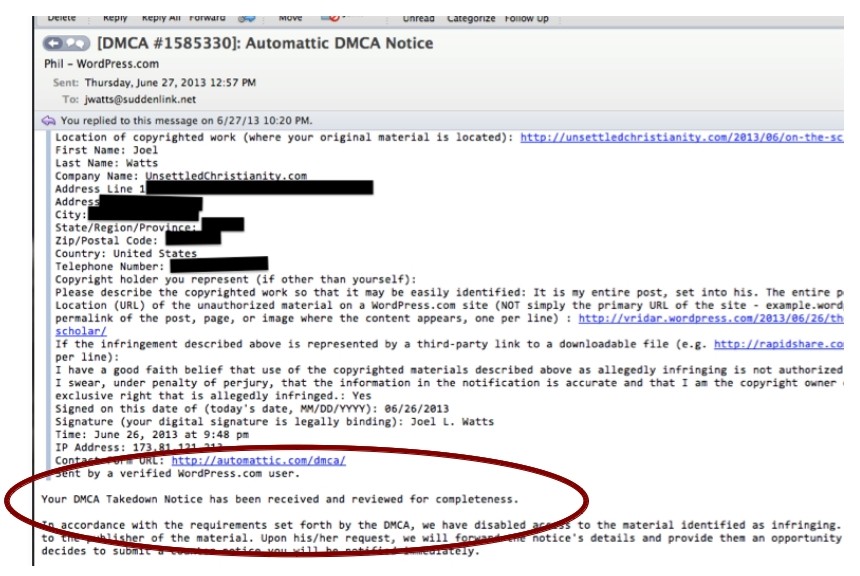I think I am expected to write some sort of angry atheist or fundamentalist atheist type response to Jim West’s recent post (or should that be linked here?):
Well, so not to disappoint, here it is.
Jim’s post came to my attention through a pingback from Joel Watts’ blog with a link to my previous post titled Frederiksen’s Fallacy. (Joel calls me a “fundamentalist atheist” — I have no idea why or what that means even. So perhaps Joel or someone might like to explain to me what I am supposed to be. Which reminds me, Why did Joel retreat from all his recent posturing when it was pointed out to him that the evidence for historicity of other persons is tangible and real while Jesus really is the anomaly?)
Well, my first response on reading Jim’s post was “So what?”. What’s the fuss about? I have no problem with faithful Bible believers studying the Bible according to their agenda. I think seminaries or privately funded bible colleges are just the right place for it, too. As for Jim’s argument, it wasn’t so much an argument as a soapbox cry for attention. No evidence or justifications were supplied to buttress his many assertions. So why the serious responses?
One or two spoke of some who study the Bible with some sort of hostile intent. I don’t know who is guilty of that, and I can’t quite imagine how anyone could seriously “study” the Bible with “hostility”. That doesn’t make any sense to me. So I am confused about the responses to Jim’s post for a number of reasons.
But what astonished me was the number of responses from some of the most learned of scholars to this pastor’s complaint. I am still wondering what he said in his post that should elicit such apparently serious responses.
But to one of the points I think I am expected to respond —
To suggest that only “the faithful” might be the only one’s to benefit from a study of the Bible, or even to suggest that the Bible is uniquely the possession of “the faithful”, sounds like a bit of headline grabbing overstatement. Does anyone really think Jim truly believes this? Or maybe he does and I don’t know him well enough.
But for the sake of a response, that’s a bit like saying that no-one today can meaningfully study Homer’s epics because we don’t believe in the Olympian gods anymore.
Or if you don’t believe in the Ideas of Plato you shouldn’t study Plato.
Only Nazis can meaningfully study Hitler.
But I get the impression Jim is just writing to shit-stir.
But if he really is serious, and I have to concede the possibility, then I might go to the trouble of further spelling out that the reason the Bible is a worthwhile study is that it has such a central place in our culture. It is our history and has had a significant role in shaping our larger identities.
I certainly have no hostile interest in Bible study. Why would I bother? I gave my reasons for this blog and my interest a little while back. I love exploring clues as to how the Bible came to be put together, how its parts originated, and what it may have meant to its original audiences.
I find the study of the Bible rewarding for what I learn about the origins and makings of a significant part of our cultural heritage.
It is also good to understand it to help assess it’s rightful place in contemporary society and individual lives.
And if along the way I discover that a good deal of mainstream biblical studies should really be dismissed as pseudoscholarship, then yes, I do feel that is something that ought to be exposed. If I am mistaken, then I am sure the good scholars I address this way will be able to pinpoint concisely why I am in error and correct me. I am sure genuine scholars do not need to resort to insult and straw-man arguments.
And what’s wrong or meaningless with any of this?
And where on earth does any “hostility against the Bible” appear even for a nanosecond?
P.S.
Oh yes — one most remarkable comment I did see in one of the sites with Jim’s post: someone said that if all out thought processes can be explained naturally then we have no basis for morality or meaning of existence! Hoo boy! Is these people really products of the most advanced technological and scientific society in the history of the world? Such thinking must surely be more akin to something we would expect to find in the remote caves of northern Pakistan. The seminaries and private bible colleges are for this sort of thinking. Not public universities — how can even intelligentsia in public universities bother with this sort of thinking?
Like this:
Like Loading...
 But after learning that Joel had clearly turned back his system clock to make it look like he had indeed sent me an email to try to arrange a one-to-one settlement to the dispute as required, and that he had subsequently removed the Creative Commons notice to the page that I had (rightfully) copied for critical review, I sent an amended counter-notice four days later. I asked about this and Automattic assured me that the amended counter-notice made no difference to the time schedule and that I am free to republish the post in question. Continue reading “Joel Watts Fails to Defend His DMCA Takedown Application Against Vridar”
But after learning that Joel had clearly turned back his system clock to make it look like he had indeed sent me an email to try to arrange a one-to-one settlement to the dispute as required, and that he had subsequently removed the Creative Commons notice to the page that I had (rightfully) copied for critical review, I sent an amended counter-notice four days later. I asked about this and Automattic assured me that the amended counter-notice made no difference to the time schedule and that I am free to republish the post in question. Continue reading “Joel Watts Fails to Defend His DMCA Takedown Application Against Vridar”







